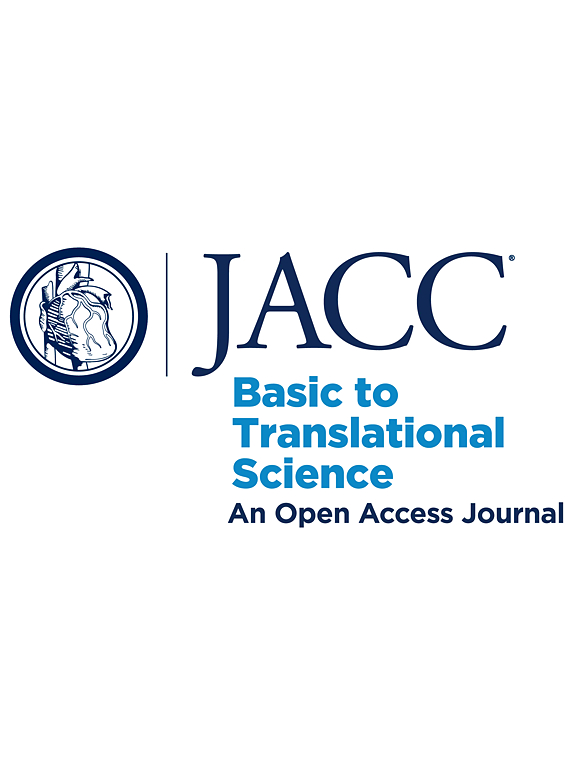SIRT1 Ameliorates Lamin A/C Deficiency-Induced Cardiac Dysfunction by Promoting Mitochondrial Bioenergetics
IF 8.4
1区 医学
Q1 CARDIAC & CARDIOVASCULAR SYSTEMS
引用次数: 0
Abstract
Dilated cardiomyopathy (DCM) is associated with high mortality despite advanced therapies. The LMNA gene encodes lamin A/C and is the second most frequently mutated gene associated with DCM, for which therapeutic options are limited. Here we generated Lmna–/– mice and found they exhibited cardiac dysfunction at the age of 1 month but not at 2 weeks. Proteomics showed down-regulation of mitochondrial function–related pathways in Lmna–/– hearts. Moreover, early injured mitochondria with decreased cristae density and sirtuin 1 (SIRT1) down-regulation were observed in 2-week-old Lmna–/– hearts. Adenoviral overexpression of SIRT1 in lamin A/C knockdown neonatal rat ventricular myocytes improved mitochondrial oxidative respiration capacity. Adeno-associated virus–mediated SIRT1 overexpression alleviated mitochondrial injury, cardiac systolic dysfunction, ventricular dilation, and fibrosis, and prolonged lifespan in Lmna–/– mice. Mechanistically, LMNA maintains mitochondrial bioenergetics through the SIRT1-PARKIN axis. Our results suggest that targeting the SIRT1 signaling pathway is expected to be a novel therapeutic strategy for LMNA mutation–associated DCM.
SIRT1 通过促进线粒体生物能改善维生素 A/C缺乏诱导的心功能障碍
尽管有先进的疗法,扩张型心肌病(DCM)的死亡率仍然很高。LMNA 基因编码层粘连蛋白 A/C,是与 DCM 相关的第二大最常见突变基因,其治疗方案十分有限。在这里,我们产生了 Lmna-/- 小鼠,发现它们在 1 个月大时表现出心脏功能障碍,但在 2 周时则没有。蛋白质组学显示,Lmna-/-小鼠心脏中线粒体功能相关通路下调。此外,在2周大的Lmna-/-心脏中观察到早期损伤的线粒体,嵴密度降低,sirtuin 1(SIRT1)下调。在板层蛋白 A/C敲除的新生大鼠心室肌细胞中,腺病毒过表达 SIRT1 提高了线粒体氧化呼吸能力。腺相关病毒介导的 SIRT1 过表达减轻了线粒体损伤、心脏收缩功能障碍、心室扩张和纤维化,并延长了 Lmna-/- 小鼠的寿命。从机制上讲,LMNA 通过 SIRT1-PARKIN 轴维持线粒体生物能。我们的研究结果表明,靶向 SIRT1 信号通路有望成为 LMNA 突变相关 DCM 的一种新型治疗策略。
本文章由计算机程序翻译,如有差异,请以英文原文为准。
求助全文
约1分钟内获得全文
求助全文
来源期刊

JACC: Basic to Translational Science
CARDIAC & CARDIOVASCULAR SYSTEMS-
CiteScore
14.20
自引率
1.00%
发文量
161
审稿时长
16 weeks
期刊介绍:
JACC: Basic to Translational Science is an open access journal that is part of the renowned Journal of the American College of Cardiology (JACC). It focuses on advancing the field of Translational Cardiovascular Medicine and aims to accelerate the translation of new scientific discoveries into therapies that improve outcomes for patients with or at risk for Cardiovascular Disease. The journal covers thematic areas such as pre-clinical research, clinical trials, personalized medicine, novel drugs, devices, and biologics, proteomics, genomics, and metabolomics, as well as early phase clinical trial methodology.
 求助内容:
求助内容: 应助结果提醒方式:
应助结果提醒方式:


